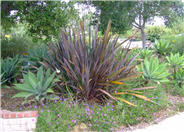
Common name:New Zealand Flax, Purple
Botanical name:Phormium tenax 'Atropurpureum'
Phormium tenax 'Atropurpureum' is an evergreen perennial. Big, dramatic plant composed of many swordlike, stiffly vertical leaves can reach 5' tall. Leaves are purple red. Flowers stems reach high above leaves, bearing clusters of 1"-2" blossoms in dark red.
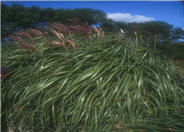
Common name:Eulalia Grass, Flamingo
Botanical name:Miscanthus sinensis 'Flamingo'
These deciduous grasses grow from 4'-7' tall, and often turn orange or dark red before going dormant. Tall, showy spikes of feathery, curved seed heads are borne and retained well into the winter or the following spring. It should receive sun to part shade, and average to little summer watering. Tall grasses are highly combustible.
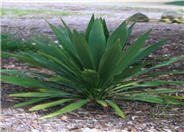
Common name:Spear Lily
Botanical name:Doryanthes palmeri
This large succulent will grow 6'-15' high and produces huge clusters of leaves. It produces clusters of reddish brown flowers that bloom in the summer and does well in a lot of shade with regular water.
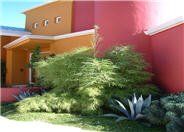
Common name:Mexican Weeping Bamboo
Botanical name:Otatea acuminata aztecorum
This Bamboo is an exotic plant that has tall fronds that sway in the wind like a kelp bed forest. This plant can be invasive.
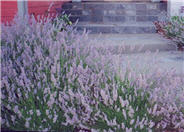
Common name:Provence Lavender
Botanical name:Lavandula X intermedia 'Provence'
With tall 24"-30" stems, 'Provence' has true, lavender colored flowers that are fragrant and excellent for cutting. It flowers in early June and has large, gray green leaves.
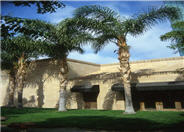
Common name:Queen Palm
Botanical name:Syagrus romanzoffianum
This palm has a very straight trunk to about 50' in height. It has arching, feathery, bright green, glossy leaves that can be 10'-15' long. It is fragile in heavy winds and a fast grower. It will become damaged in temperature below 24 degrees F.
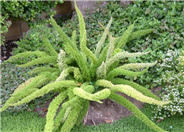
Common name:Myers Asparagus
Botanical name:Asparagus densiflorus 'Myers'
An evergreen groundcover, the 'Myers' also makes an excellent hanging basket plant when larger in size. Its formal looking fronds have an even, spiral arrangement of leaflets. It is damaged by severe frosts, and looks best with at least occasional watering.
Designer: Billy Goodnick
Photographer: GardenSoft
Physical weed control, including mulching, or hand removal protects the watershed from harmful chemicals.
Group plants in your garden according to their water needs (hydrozone).
Attract, or buy beneficial insects such as ladybugs and lacewings to control pest outbreaks in your garden.